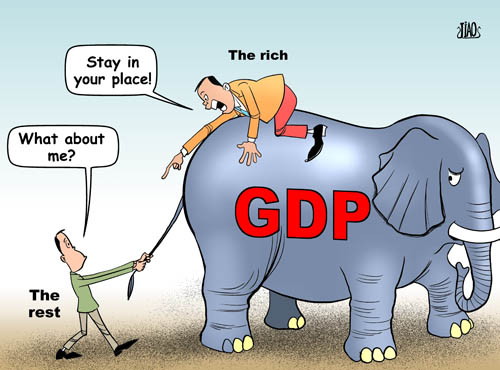Corruption & monopoly behind wealth gap
|
|
|
GDP galloping along?? [By Jiao Haiyang/China.org.cn] |
The gap between rich and poor is a serious social problem in China, and it has been getting wider since the 1980s.
There are many reasons for the huge disparity in wealth. But corruption and monopoly top the list.
We need to correctly understand the causes of the problem. The widening wealth gap is sometimes attributed to the market, but this theory has been shown to be groundless. Income disparities in a market economy are greater than in a planned economy. But they are not so great that people are unwilling to tolerate them. Both government and non-governmental sectors should try to mitigate the negative effects of the market-related wealth gap. But we need to recognize it is different from wealth disparities caused by administrative power and monopoly.
People often display a blind hostility towards the rich, and this can lead to social instability. Some rich people gained their wealth through connections with officials. Others, however, made their profits through hard work and management expertise.
The middle class of professionals and white collar workers is growing in China. They are a very important bulwark of social stability. The proportion of middle-class people in China is currently quite small but it is growing rapidly and they are gradually emerging as an important social force.
But we should not be too optimistic about the Chinese middle class because they have many weaknesses. They have not yet realized that their fundamental interests lie in the improvement of the country's economic system. Many of them still look for shortcuts to improve their lives, and the easiest way to do this is to make friends with officials. But this harms the interests of others.
The middle classes lack civic consciousness and some have forgotten their duties as citizens. They do not realize that the improvement of their personal lives depends on the development of the whole society. An individual cannot aspire to a better life in an imperfect social system.
This article was first published in Chinese and translated by Yang Xi.
 0
0 







